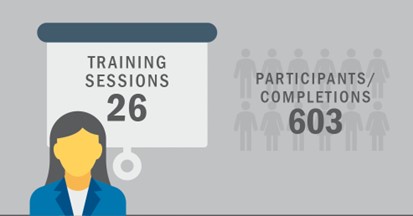Building Science training courses are tailored to meet the needs of individuals ranging from beginners to experts in the field. These courses are designed to enhance your knowledge and equip you with the skills needed to take your career to the next level, regardless of whether you are new to the topic or have years of experience.

2023 Training Highlights
From all throughout the United States and its territories, FEMA Building Science was able to provide nationwide training throughout Fiscal Year 2023, with over 26 sessions held and 603+ participants engaged.
FEMA believes education can transform individuals and communities and is deeply committed to fostering growth and enhancing capabilities across various disciplines. Our dedication to providing top-tier training extends to FEMA staff, State, local, tribal and territorial government (SLTTs) officials, communities nationwide and building professionals.
Our goal is to create a skilled, resilient society ready to face challenges with confidence. Through our Building Science training courses, participants gain access to expert insights, cutting-edge research, and practical tools to address complex challenges in building design, construction, and resilience.
Did you know?
Other courses and education opportunities are available on demand. We can provide training via webinar on Building Codes, MAT report findings, and more! Contact us today to learn more!
Whether you’re a seasoned professional seeking to stay abreast of industry advancements or a newcomer eager to develop a strong foundation in building science principles, FEMA’s comprehensive training programs offer valuable resources to support your professional growth and contribute to building safer, more resilient communities. Join us in our mission to build a brighter, more resilient future through education and innovation in building science.
If you're looking for more information on the various courses available to you, don't hesitate to contact the FEMA Building Science Helpline or call 866-927-2104.

Additional building science and building code courses are available from the National Earthquake Technical Assistance Program.
Course Catalog
Please note, CEUs and other credits are often available for the following courses.

